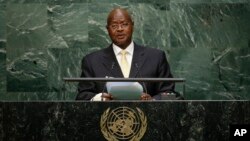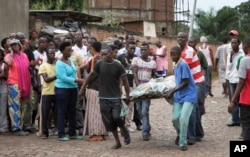Uganda announced Saturday that it would mediate peace talks between government and opposition groups in Burundi in an effort to end Burundi's deadly political unrest.
Speaking to reporters in Kampala, Ugandan Defense Minister Crispus Kiyonga said 14 groups including Burundi's ruling party, opposition parties and civil society organizations are to attend the talks scheduled for December 28.
He said Ugandan President Yoweri Museveni will moderate the discussions.
Both Burundi's government and the largest opposition coalition welcomed the move to resume peace talks to address the deterioration of the security situation in the country, where hundreds of people have been killed.
Peacekeepers
The African Union's peace and security council this past week authorized deployment of 5,000 peacekeepers for an initial period of six months to Burundi and gave the government a four-day deadline to accept the troops.
The council condemned recent violence in Burundi, including attacks on military barracks in the capital last week that reportedly left 87 people dead.
The statement said the AU would not allow Burundi to descend into widespread violence that could affect the wider region.
The government in Bujumbura said Saturday it is not consenting to the arrival of foreign troops – soldiers and police, arguing that it has the right under AU protocols to reject the troops.
A Burundian presidential adviser said Saturday that the AU will be violating Burundi’s sovereignty if it goes ahead with plans to send in peacekeepers.
Violence, unrest
Burundi has experienced eight months of violence and unrest since the announcement that President Pierre Nkurunziza would seek a third term, a move his critics say is unconstitutional.
The president was re-elected in July in a vote boycotted by the opposition.
The United Nations' top human rights official, Zeid Ra'ad Al Hussein, warned earlier this week that Burundi was on a trajectory back to its "horrendously violent past" that must be countered by the international community.
He said more than 400 people have been killed since protests against the president began in April. More than 200,000 Burundians have fled to neighboring countries. Nearly 3,500 people have been arrested in the political crisis.
Burundi is still emerging from a 12-year civil war ending in 2005 that killed about 300,000 people.






